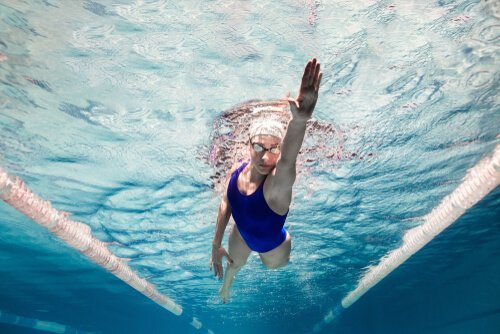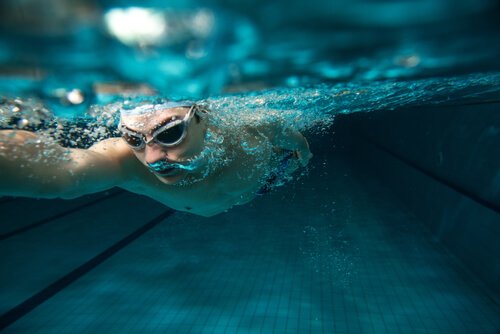5 Psychological Benefits you Get from Swimming

Swimming is a greatly recommended form of exercise for people of all ages. It is an activity that keeps our bodies healthy, and also our minds. If you compare it to other sports, such as running, it is actually much less harmful and we exercise more muscles by doing it.
From a psychological perspective, it is an oasis for our day to day problems and the anxiety that they bring. At the same time, it allows the development of very positive values such as perseverance and tenacity.
The physical benefits of swimming
In addition to this, the physical benefits of swimming are unlimited. Broadly speaking, it is a fairly complete sport, fantastic for cardiovascular training, endurance and toning. It is also an ideal activity for those who are recovering from an injury or for those who suffer from joint pain.
Doctors and other experts tell us that swimming is the only sport that is recommended in more than 80% of medical cases and has a large target audience, accessible for children right through to the elderly. In fact, studies confirm that swimming helps us fight against many diseases and disorders by creating a state of physical and psychological comfort inside us.
Research has also found that water exerts a strong invigorating effect on our nervous system. For this reason, aquatic activities are usually recommended to people suffering from mental disorders.
We can clearly see that swimming has an extraordinary power to strengthen our health. However, are you also familiar with the psychological benefits of swimming? Here are 5 of them:
It reduces stress
First of all, swimming can reduce stress to the same degree or even more so than other physical activities. It is a very relaxing activity, and this allows a greater flow of oxygen to the muscles, enabling to regulate your own breathing.
Swimming can also help promote the growth of new brain cells in parts of the brain that lose them due to chronic stress. Because of this, it is an activity that can positively influence your ability to manage and cope with stress.

It gives you energy
In general, after taking part in most sporting activities, you feel extremely tired. However, swimming is unique in this regard. In fact, experts recommend swimming in the morning to start the day on the right foot. This will give you more energy to face the day, feeling good about yourself and life in general.
It reinforces your self-esteem
Swimming is physical training for the whole body. It really does allow you to burn excess fat and tone your muscles. This, in turn, increases your confidence in yourself and your self-esteem. There is a domino effect here: when you feel better about yourself, your mood improves naturally!
“To achieve what you have never had you will have to do what you have never done”
-Mireia Belmonte-
It increases brain power
Cardiovascular training causes oxygenated blood to be pumped more effectively around the body. The greater the blood flow, the more oxygen the brain receives. In other words, the better your brain works, the better the body will react.
Through swimming, you will experience how daily tasks are easier to carry out, as well as observing how your concentration levels increase noticeably.

Antidepressant
The last on our list of swimming’s psychological benefits is by no means the least. Swimming has an amazing antidepressant effect. Despite being a sport that is carried out individually, classes are usually group-based. These classes provide a social experience for the participants. Overcoming the continuous challenges involved in swimming provides a sense of achievement. Swimming causes the release of endorphins and also neurotransmitters, such as serotonin.
In conclusion, this really is a unique form of exercise, as it allows us to reap the benefits of aerobic, anaerobic and resistance training without impacting negatively on our bones and muscles. So, what are you waiting for? Get in that pool and start doing those lengths!
Swimming is a greatly recommended form of exercise for people of all ages. It is an activity that keeps our bodies healthy, and also our minds. If you compare it to other sports, such as running, it is actually much less harmful and we exercise more muscles by doing it.
From a psychological perspective, it is an oasis for our day to day problems and the anxiety that they bring. At the same time, it allows the development of very positive values such as perseverance and tenacity.
The physical benefits of swimming
In addition to this, the physical benefits of swimming are unlimited. Broadly speaking, it is a fairly complete sport, fantastic for cardiovascular training, endurance and toning. It is also an ideal activity for those who are recovering from an injury or for those who suffer from joint pain.
Doctors and other experts tell us that swimming is the only sport that is recommended in more than 80% of medical cases and has a large target audience, accessible for children right through to the elderly. In fact, studies confirm that swimming helps us fight against many diseases and disorders by creating a state of physical and psychological comfort inside us.
Research has also found that water exerts a strong invigorating effect on our nervous system. For this reason, aquatic activities are usually recommended to people suffering from mental disorders.
We can clearly see that swimming has an extraordinary power to strengthen our health. However, are you also familiar with the psychological benefits of swimming? Here are 5 of them:
It reduces stress
First of all, swimming can reduce stress to the same degree or even more so than other physical activities. It is a very relaxing activity, and this allows a greater flow of oxygen to the muscles, enabling to regulate your own breathing.
Swimming can also help promote the growth of new brain cells in parts of the brain that lose them due to chronic stress. Because of this, it is an activity that can positively influence your ability to manage and cope with stress.

It gives you energy
In general, after taking part in most sporting activities, you feel extremely tired. However, swimming is unique in this regard. In fact, experts recommend swimming in the morning to start the day on the right foot. This will give you more energy to face the day, feeling good about yourself and life in general.
It reinforces your self-esteem
Swimming is physical training for the whole body. It really does allow you to burn excess fat and tone your muscles. This, in turn, increases your confidence in yourself and your self-esteem. There is a domino effect here: when you feel better about yourself, your mood improves naturally!
“To achieve what you have never had you will have to do what you have never done”
-Mireia Belmonte-
It increases brain power
Cardiovascular training causes oxygenated blood to be pumped more effectively around the body. The greater the blood flow, the more oxygen the brain receives. In other words, the better your brain works, the better the body will react.
Through swimming, you will experience how daily tasks are easier to carry out, as well as observing how your concentration levels increase noticeably.

Antidepressant
The last on our list of swimming’s psychological benefits is by no means the least. Swimming has an amazing antidepressant effect. Despite being a sport that is carried out individually, classes are usually group-based. These classes provide a social experience for the participants. Overcoming the continuous challenges involved in swimming provides a sense of achievement. Swimming causes the release of endorphins and also neurotransmitters, such as serotonin.
In conclusion, this really is a unique form of exercise, as it allows us to reap the benefits of aerobic, anaerobic and resistance training without impacting negatively on our bones and muscles. So, what are you waiting for? Get in that pool and start doing those lengths!
This text is provided for informational purposes only and does not replace consultation with a professional. If in doubt, consult your specialist.







